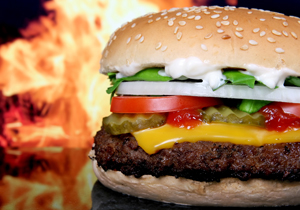Sustainable Living & Sustainable Lifestyle
Commercial charbroilers that cook some of America’s favorite hamburgers are linked to heavy air pollution.
Commercial charbroilers that cook some of America’s favorite hamburgers are linked to heavy air pollution.
The American hamburger has had a pretty rough year, from the controversy over pink slime found in some restaurants and government beef products to the recent study coming out of the University of California, Riverside, blaming the lunch treat for air pollution. Carnivores fear not, the burger is here to stay, however we should think twice about how we go about preparing our hamburgers for the sake of mother earth.
 Normally we are thrilled to report new findings on the sustainability movement, bringing you tips to help create a greener life for you and your family. This time though, it is with great sadness that we must inform you that the all American hamburger that many of us have grown to love was found to be a big polluter. That’s right, the poor little ole hamburger is emitting large amounts of particulate matter into the atmosphere when it is cooked over a charbrolier. We don’t know what the world it coming to when you can’t trust lunch, but facts are facts.
Normally we are thrilled to report new findings on the sustainability movement, bringing you tips to help create a greener life for you and your family. This time though, it is with great sadness that we must inform you that the all American hamburger that many of us have grown to love was found to be a big polluter. That’s right, the poor little ole hamburger is emitting large amounts of particulate matter into the atmosphere when it is cooked over a charbrolier. We don’t know what the world it coming to when you can’t trust lunch, but facts are facts.
Bill Welch, principal development engineer for the study at UC Riverside’s Center for Environmental Research and Technology (CE-Cert) said that “emissions from commercial charbroilers are a very significant uncontrolled source of particulate matter…more than twice the contribution by all of the heavy-duty diesel trucks.” He went on to explain that “for comparison, an 18-wheeler diesel-engine truck would have to drive 143 miles on the freeway to put out the same mass of particles as a single charbroiled hamburger patty.”
Our researcher friends (we don’t really know them) also uncovered that grilling your burger does lessen the impact of the air pollution, but it is still quite high. All great problems deserve an even greater solution and Bill Welch and team are working to solve this problem now. Implementing scrubbing technologies can help reduce the smoke and particulates being emitted, similar to scrubbers on power plants, but at a much smaller scale. Bill Welch explained that “our goal is to find something cost-effective and technically feasible to reduce the smoke.”
Before you shout “where’s the beef” when you go looking for that whopper of a hamburger, just know your Big Mac is safe (see what we did there?) with UC riverside’s team on the job.